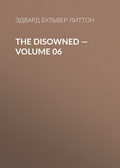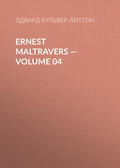
Эдвард Бульвер-Литтон
Zanoni
CHAPTER 7.XV
Il ne veulent plus perdre un moment d’une nuit si precieuse.
Lacretelle, tom. xii.
(They would not lose another moment of so precious a night.)
It was late that night, and Rene-Francois Dumas, President of the Revolutionary Tribunal, had re-entered his cabinet, on his return from the Jacobin Club. With him were two men who might be said to represent, the one the moral, the other the physical force of the Reign of Terror: Fouquier-Tinville, the Public Accuser, and Francois Henriot, the General of the Parisian National Guard. This formidable triumvirate were assembled to debate on the proceedings of the next day; and the three sister-witches over their hellish caldron were scarcely animated by a more fiend-like spirit, or engaged in more execrable designs, than these three heroes of the Revolution in their premeditated massacre of the morrow.
Dumas was but little altered in appearance since, in the earlier part of this narrative, he was presented to the reader, except that his manner was somewhat more short and severe, and his eye yet more restless. But he seemed almost a superior being by the side of his associates. Rene Dumas, born of respectable parents, and well educated, despite his ferocity, was not without a certain refinement, which perhaps rendered him the more acceptable to the precise and formal Robespierre. (Dumas was a beau in his way. His gala-dress was a BLOOD-RED COAT, with the finest ruffles.) But Henriot had been a lackey, a thief, a spy of the police; he had drunk the blood of Madame de Lamballe, and had risen to his present rank for no quality but his ruffianism; and Fouquier-Tinville, the son of a provincial agriculturist, and afterwards a clerk at the Bureau of the Police, was little less base in his manners, and yet more, from a certain loathsome buffoonery, revolting in his speech,—bull-headed, with black, sleek hair, with a narrow and livid forehead, with small eyes, that twinkled with a sinister malice; strongly and coarsely built, he looked what he was, the audacious bully of a lawless and relentless Bar.
Dumas trimmed the candles, and bent over the list of the victims for the morrow.
“It is a long catalogue,” said the president; “eighty trials for one day! And Robespierre’s orders to despatch the whole fournee are unequivocal.”
“Pooh!” said Fouquier, with a coarse, loud laugh; “we must try them en masse. I know how to deal with our jury. ‘Je pense, citoyens, que vous etes convaincus du crime des accuses?’ (I think, citizens, that you are convinced of the crime of the accused.) Ha! ha!—the longer the list, the shorter the work.”
“Oh, yes,” growled out Henriot, with an oath,—as usual, half-drunk, and lolling on his chair, with his spurred heels on the table,—“little Tinville is the man for despatch.”
“Citizen Henriot,” said Dumas, gravely, “permit me to request thee to select another footstool; and for the rest, let me warn thee that to-morrow is a critical and important day; one that will decide the fate of France.”
“A fig for little France! Vive le Vertueux Robespierre, la Colonne de la Republique! (Long life to the virtuous Robespierre, the pillar of the Republic!) Plague on this talking; it is dry work. Hast thou no eau de vie in that little cupboard?”
Dumas and Fouquier exchanged looks of disgust. Dumas shrugged his shoulders, and replied,—
“It is to guard thee against eau de vie, Citizen General Henriot, that I have requested thee to meet me here. Listen if thou canst!”
“Oh, talk away! thy metier is to talk, mine to fight and to drink.”
“To-morrow, I tell thee then, the populace will be abroad; all factions will be astir. It is probable enough that they will even seek to arrest our tumbrils on their way to the guillotine. Have thy men armed and ready; keep the streets clear; cut down without mercy whomsoever may obstruct the ways.”
“I understand,” said Henriot, striking his sword so loudly that Dumas half-started at the clank,—“Black Henriot is no ‘Indulgent.’”
“Look to it, then, citizen,—look to it! And hark thee,” he added, with a grave and sombre brow, “if thou wouldst keep thine own head on thy shoulders, beware of the eau de vie.”
“My own head!—sacre mille tonnerres! Dost thou threaten the general of the Parisian army?”
Dumas, like Robespierre, a precise atrabilious, and arrogant man, was about to retort, when the craftier Tinville laid his hand on his arm, and, turning to the general, said, “My dear Henriot, thy dauntless republicanism, which is too ready to give offence, must learn to take a reprimand from the representative of Republican Law. Seriously, mon cher, thou must be sober for the next three or four days; after the crisis is over, thou and I will drink a bottle together. Come, Dumas relax thine austerity, and shake hands with our friend. No quarrels amongst ourselves!”
Dumas hesitated, and extended his hand, which the ruffian clasped; and, maudlin tears succeeding his ferocity, he half-sobbed, half-hiccoughed forth his protestations of civism and his promises of sobriety.
“Well, we depend on thee, mon general,” said Dumas; “and now, since we shall all have need of vigour for to-morrow, go home and sleep soundly.”
“Yes, I forgive thee, Dumas,—I forgive thee. I am not vindictive,—I! but still, if a man threatens me; if a man insults me—” and, with the quick changes of intoxication, again his eyes gleamed fire through their foul tears. With some difficulty Fouquier succeeded at last in soothing the brute, and leading him from the chamber. But still, as some wild beast disappointed of a prey, he growled and snarled as his heavy tread descended the stairs. A tall trooper, mounted, was leading Henriot’s horse to and fro the streets; and as the general waited at the porch till his attendant turned, a stranger stationed by the wall accosted him:
“General Henriot, I have desired to speak with thee. Next to Robespierre, thou art, or shouldst be, the most powerful man in France.”
“Hem!—yes, I ought to be. What then?—every man has not his deserts!”
“Hist!” said the stranger; “thy pay is scarcely suitable to thy rank and thy wants.”
“That is true.”
“Even in a revolution, a man takes care of his fortunes!”
“Diable! speak out, citizen.”
“I have a thousand pieces of gold with me,—they are thine, if thou wilt grant me one small favour.”
“Citizen, I grant it!” said Henriot, waving his hand majestically. “Is it to denounce some rascal who has offended thee?”
“No; it is simply this: write these words to President Dumas, ‘Admit the bearer to thy presence; and, if thou canst, grant him the request he will make to thee, it will be an inestimable obligation to Francois Henriot.’” The stranger, as he spoke, placed pencil and tablets in the shaking hands of the soldier.
“And where is the gold?”
“Here.”
With some difficulty, Henriot scrawled the words dictated to him, clutched the gold, mounted his horse, and was gone.
Meanwhile Fouquier, when he had closed the door upon Henriot, said sharply, “How canst thou be so mad as to incense that brigand? Knowest thou not that our laws are nothing without the physical force of the National Guard, and that he is their leader?”
“I know this, that Robespierre must have been mad to place that drunkard at their head; and mark my words, Fouquier, if the struggle come, it is that man’s incapacity and cowardice that will destroy us. Yes, thou mayst live thyself to accuse thy beloved Robespierre, and to perish in his fall.”
“For all that, we must keep well with Henriot till we can find the occasion to seize and behead him. To be safe, we must fawn on those who are still in power; and fawn the more, the more we would depose them. Do not think this Henriot, when he wakes to-morrow, will forget thy threats. He is the most revengeful of human beings. Thou must send and soothe him in the morning!”
“Right,” said Dumas, convinced. “I was too hasty; and now I think we have nothing further to do, since we have arranged to make short work with our fournee of to-morrow. I see in the list a knave I have long marked out, though his crime once procured me a legacy,—Nicot, the Hebertist.”
“And young Andre Chenier, the poet? Ah, I forgot; we be headed HIM to-day! Revolutionary virtue is at its acme. His own brother abandoned him.” (His brother is said, indeed, to have contributed to the condemnation of this virtuous and illustrious person. He was heard to cry aloud, “Si mon frere est coupable, qu’il perisse” (If my brother be culpable, let him die). This brother, Marie-Joseph, also a poet, and the author of “Charles IX.,” so celebrated in the earlier days of the Revolution, enjoyed, of course, according to the wonted justice of the world, a triumphant career, and was proclaimed in the Champ de Mars “le premier de poetes Francais,” a title due to his murdered brother.)
“There is a foreigner,—an Italian woman in the list; but I can find no charge made out against her.”
“All the same we must execute her for the sake of the round number; eighty sounds better than seventy-nine!”
Here a huissier brought a paper on which was written the request of Henriot.
“Ah! this is fortunate,” said Tinville, to whom Dumas chucked the scroll,—“grant the prayer by all means; so at least that it does not lessen our bead-roll. But I will do Henriot the justice to say that he never asks to let off, but to put on. Good-night! I am worn out—my escort waits below. Only on such an occasion would I venture forth in the streets at night.” (During the latter part of the Reign of Terror, Fouquier rarely stirred out at night, and never without an escort. In the Reign of Terror those most terrified were its kings.) And Fouquier, with a long yawn, quitted the room.
“Admit the bearer!” said Dumas, who, withered and dried, as lawyers in practice mostly are, seemed to require as little sleep as his parchments.
The stranger entered.
“Rene-Francois Dumas,” said he, seating himself opposite to the president, and markedly adopting the plural, as if in contempt of the revolutionary jargon, “amidst the excitement and occupations of your later life, I know not if you can remember that we have met before?”
The judge scanned the features of his visitor, and a pale blush settled on his sallow cheeks, “Yes, citizen, I remember!”
“And you recall the words I then uttered! You spoke tenderly and philanthropically of your horror of capital executions; you exulted in the approaching Revolution as the termination of all sanguinary punishments; you quoted reverently the saying of Maximilien Robespierre, the rising statesman, ‘The executioner is the invention of the tyrant:’ and I replied, that while you spoke, a foreboding seized me that we should meet again when your ideas of death and the philosophy of revolutions might be changed! Was I right, Citizen Rene-Francois Dumas, President of the Revolutionary Tribunal?”
“Pooh!” said Dumas, with some confusion on his brazen brow, “I spoke then as men speak who have not acted. Revolutions are not made with rose-water! But truce to the gossip of the long-ago. I remember, also, that thou didst then save the life of my relation, and it will please thee to learn that his intended murderer will be guillotined to-morrow.”
“That concerns yourself,—your justice or your revenge. Permit me the egotism to remind you that you then promised that if ever a day should come when you could serve me, your life—yes, the phrase was, ‘your heart’s blood‘—was at my bidding. Think not, austere judge, that I come to ask a boon that can affect yourself,—I come but to ask a day’s respite for another!”
“Citizen, it is impossible! I have the order of Robespierre that not one less than the total on my list must undergo their trial for to-morrow. As for the verdict, that rests with the jury!”
“I do not ask you to diminish the catalogue. Listen still! In your death-roll there is the name of an Italian woman whose youth, whose beauty, and whose freedom not only from every crime, but every tangible charge, will excite only compassion, and not terror. Even YOU would tremble to pronounce her sentence. It will be dangerous on a day when the populace will be excited, when your tumbrils may be arrested, to expose youth and innocence and beauty to the pity and courage of a revolted crowd.”
Dumas looked up and shrunk from the eye of the stranger.
“I do not deny, citizen, that there is reason in what thou urgest. But my orders are positive.”
“Positive only as to the number of the victims. I offer you a substitute for this one. I offer you the head of a man who knows all of the very conspiracy which now threatens Robespierre and yourself, and compared with one clew to which, you would think even eighty ordinary lives a cheap purchase.”
“That alters the case,” said Dumas, eagerly; “if thou canst do this, on my own responsibility I will postpone the trial of the Italian. Now name the proxy!”
“You behold him!”
“Thou!” exclaimed Dumas, while a fear he could not conceal betrayed itself through his surprise. “Thou!—and thou comest to me alone at night, to offer thyself to justice. Ha!—this is a snare. Tremble, fool!—thou art in my power, and I can have BOTH!”
“You can,” said the stranger, with a calm smile of disdain; “but my life is valueless without my revelations. Sit still, I command you,—hear me!” and the light in those dauntless eyes spell-bound and awed the judge. “You will remove me to the Conciergerie,—you will fix my trial, under the name of Zanoni, amidst your fournee of to-morrow. If I do not satisfy you by my speech, you hold the woman I die to save as your hostage. It is but the reprieve for her of a single day that I demand. The day following the morrow I shall be dust, and you may wreak your vengeance on the life that remains. Tush! judge and condemner of thousands, do you hesitate,—do you imagine that the man who voluntarily offers himself to death will be daunted into uttering one syllable at your Bar against his will? Have you not had experience enough of the inflexibility of pride and courage? President, I place before you the ink and implements! Write to the jailer a reprieve of one day for the woman whose life can avail you nothing, and I will bear the order to my own prison: I, who can now tell this much as an earnest of what I can communicate,—while I speak, your own name, judge, is in a list of death. I can tell you by whose hand it is written down; I can tell you in what quarter to look for danger; I can tell you from what cloud, in this lurid atmosphere, hangs the storm that shall burst on Robespierre and his reign!”
Dumas grew pale; and his eyes vainly sought to escape the magnetic gaze that overpowered and mastered him. Mechanically, and as if under an agency not his own, he wrote while the stranger dictated.
“Well,” he said then, forcing a smile to his lips, “I promised I would serve you; see, I am faithful to my word. I suppose that you are one of those fools of feeling,—those professors of anti-revolutionary virtue, of whom I have seen not a few before my Bar. Faugh! it sickens me to see those who make a merit of incivism, and perish to save some bad patriot, because it is a son, or a father, or a wife, or a daughter, who is saved.”
“I AM one of those fools of feeling,” said the stranger, rising. “You have divined aright.”
“And wilt thou not, in return for my mercy, utter to-night the revelations thou wouldst proclaim to-morrow? Come; and perhaps thou too—nay, the woman also—may receive, not reprieve, but pardon.”
“Before your tribunal, and there alone! Nor will I deceive you, president. My information may avail you not; and even while I show the cloud, the bolt may fall.”
“Tush! prophet, look to thyself! Go, madman, go. I know too well the contumacious obstinacy of the class to which I suspect thou belongest, to waste further words. Diable! but ye grow so accustomed to look on death, that ye forget the respect ye owe to it. Since thou offerest me thy head, I accept it. To-morrow thou mayst repent; it will be too late.”
“Ay, too late, president!” echoed the calm visitor.
“But, remember, it is not pardon, it is but a day’s reprieve, I have promised to this woman. According as thou dost satisfy me to-morrow, she lives or dies. I am frank, citizen; thy ghost shall not haunt me for want of faith.”
“It is but a day that I have asked; the rest I leave to justice and to Heaven. Your huissiers wait below.”
CHAPTER 7.XVI
Und den Mordstahl seh’ ich blinken;
Und das Morderauge gluhn!
“Kassandra.”
(And I see the steel of Murder glitter,
And the eye of Murder glow.)
Viola was in the prison that opened not but for those already condemned before adjudged. Since her exile from Zanoni, her very intellect had seemed paralysed. All that beautiful exuberance of fancy which, if not the fruit of genius, seemed its blossoms; all that gush of exquisite thought which Zanoni had justly told her flowed with mysteries and subtleties ever new to him, the wise one,—all were gone, annihilated; the blossom withered, the fount dried up. From something almost above womanhood, she seemed listlessly to sink into something below childhood. With the inspirer the inspirations had ceased; and, in deserting love, genius also was left behind.
She scarcely comprehended why she had been thus torn from her home and the mechanism of her dull tasks. She scarcely knew what meant those kindly groups, that, struck with her exceeding loveliness, had gathered round her in the prison, with mournful looks, but with words of comfort. She, who had hitherto been taught to abhor those whom Law condemns for crime, was amazed to hear that beings thus compassionate and tender, with cloudless and lofty brows, with gallant and gentle mien, were criminals for whom Law had no punishment short of death. But they, the savages, gaunt and menacing, who had dragged her from her home, who had attempted to snatch from her the infant while she clasped it in her arms, and laughed fierce scorn at her mute, quivering lips,—THEY were the chosen citizens, the men of virtue, the favourites of Power, the ministers of Law! Such thy black caprices, O thou, the ever-shifting and calumnious,—Human Judgment!
A squalid, and yet a gay world, did the prison-houses of that day present. There, as in the sepulchre to which they led, all ranks were cast with an even-handed scorn. And yet there, the reverence that comes from great emotions restored Nature’s first and imperishable, and most lovely, and most noble Law,—THE INEQUALITY BETWEEN MAN AND MAN! There, place was given by the prisoners, whether royalists or sans-culottes, to Age, to Learning, to Renown, to Beauty; and Strength, with its own inborn chivalry, raised into rank the helpless and the weak. The iron sinews and the Herculean shoulders made way for the woman and the child; and the graces of Humanity, lost elsewhere, sought their refuge in the abode of Terror.
“And wherefore, my child, do they bring thee hither?” asked an old, grey-haired priest.
“I cannot guess.”
“Ah, if you know not your offence, fear the worst!”
“And my child?”—for the infant was still suffered to rest upon her bosom.
“Alas, young mother, they will suffer thy child to live.’
“And for this,—an orphan in the dungeon!” murmured the accusing heart of Viola,—“have I reserved his offspring! Zanoni, even in thought, ask not—ask not what I have done with the child I bore thee!”
Night came; the crowd rushed to the grate to hear the muster-roll. (Called, in the mocking jargon of the day, “The Evening Gazette.”) Her name was with the doomed. And the old priest, better prepared to die, but reserved from the death-list, laid his hands on her head, and blessed her while he wept. She heard, and wondered; but she did not weep. With downcast eyes, with arms folded on her bosom, she bent submissively to the call. But now another name was uttered; and a man, who had pushed rudely past her to gaze or to listen, shrieked out a howl of despair and rage. She turned, and their eyes met. Through the distance of time she recognised that hideous aspect. Nicot’s face settled back into its devilish sneer. “At least, gentle Neapolitan, the guillotine will unite us. Oh, we shall sleep well our wedding-night!” And, with a laugh, he strode away through the crowd, and vanished into his lair.
....
She was placed in her gloomy cell, to await the morrow. But the child was still spared her; and she thought it seemed as if conscious of the awful present. In their way to the prison it had not moaned or wept. It had looked with its clear eyes, unshrinking, on the gleaming pikes and savage brows of the huissiers. And now, alone in the dungeon, it put its arms round her neck, and murmured its indistinct sounds, low and sweet as some unknown language of consolation and of heaven. And of heaven it was!—for, at the murmur, the terror melted from her soul; upward, from the dungeon and the death,—upward, where the happy cherubim chant the mercy of the All-loving, whispered that cherub’s voice. She fell upon her knees and prayed. The despoilers of all that beautifies and hallows life had desecrated the altar, and denied the God!—they had removed from the last hour of their victims the Priest, the Scripture, and the Cross! But Faith builds in the dungeon and the lazar-house its sublimest shrines; and up, through roofs of stone, that shut out the eye of Heaven, ascends the ladder where the angels glide to and fro,—PRAYER.
And there, in the very cell beside her own, the atheist Nicot sits stolid amidst the darkness, and hugs the thought of Danton, that death is nothingness. (“Ma demeure sera bientot LE NEANT” (My abode will soon be nothingness), said Danton before his judges.)) His, no spectacle of an appalled and perturbed conscience! Remorse is the echo of a lost virtue, and virtue he never knew. Had he to live again, he would live the same. But more terrible than the death-bed of a believing and despairing sinner that blank gloom of apathy,—that contemplation of the worm and the rat of the charnel-house; that grim and loathsome NOTHINGNESS which, for his eye, falls like a pall over the universe of life. Still, staring into space, gnawing his livid lip, he looks upon the darkness, convinced that darkness is forever and forever!
....
Place, there! place! Room yet in your crowded cells. Another has come to the slaughter-house.
As the jailer, lamp in hand, ushered in the stranger, the latter touched him and whispered. The stranger drew a jewel from his finger. Diantre, how the diamond flashed in the ray of the lamp! Value each head of your eighty at a thousand francs, and the jewel is more worth than all! The jailer paused, and the diamond laughed in his dazzled eyes. O thou Cerberus, thou hast mastered all else that seems human in that fell employ! Thou hast no pity, no love, and no remorse. But Avarice survives the rest, and the foul heart’s master-serpent swallows up the tribe. Ha! ha! crafty stranger, thou hast conquered! They tread the gloomy corridor; they arrive at the door where the jailer has placed the fatal mark, now to be erased, for the prisoner within is to be reprieved a day. The key grates in the lock; the door yawns,—the stranger takes the lamp and enters.







